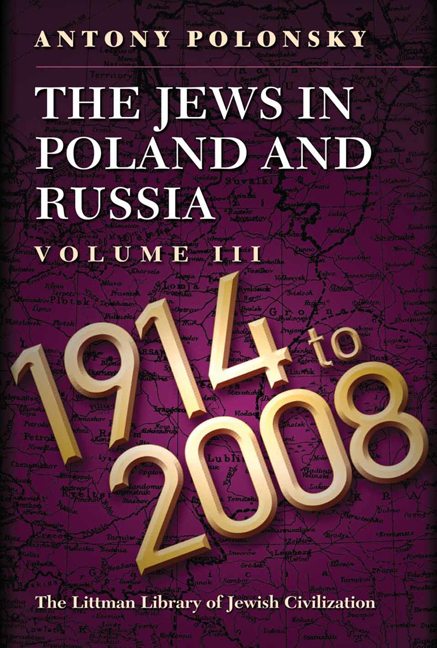Book contents
- Frontmatter
- Dedication
- Acknowledgements
- Contents
- List of Maps
- List of Tables
- Note on Transliteration
- Note on Place Names
- Maps
- General Introduction
- PART I FROM THE FIRST WORLD WAR TO THE SECOND
- PART II WAR AND GENOCIDE, 1939–1944
- PART III FROM THE END OF THE SECOND WORLD WAR TO THE COLLAPSE OF THE COMMUNIST SYSTEM
- EPILOGUE JEWS IN EASTERN EUROPE AND RUSSIA SINCE THE END OF COMMUNISM
- Conclusion
- Glossary
- Bibliography
- Index
4 - Jewish Writers in Independent Poland
- Frontmatter
- Dedication
- Acknowledgements
- Contents
- List of Maps
- List of Tables
- Note on Transliteration
- Note on Place Names
- Maps
- General Introduction
- PART I FROM THE FIRST WORLD WAR TO THE SECOND
- PART II WAR AND GENOCIDE, 1939–1944
- PART III FROM THE END OF THE SECOND WORLD WAR TO THE COLLAPSE OF THE COMMUNIST SYSTEM
- EPILOGUE JEWS IN EASTERN EUROPE AND RUSSIA SINCE THE END OF COMMUNISM
- Conclusion
- Glossary
- Bibliography
- Index
Summary
‘In a free Poland’, Yanash said decisively, ‘there will be no Jewish Question. Separatism will disappear. Just as in America, Germany, and other countries, Jews will adapt themselves to the culture of the land.
‘They will adopt the Polish language and way of life and every form of antisemitism will vanish.’
MIKHOEL BURSHTIN, Fate, 1935How did we come to this? How did we lose ourselves
In this vast world, strange and hostile to us?
JULIAN TUWIM, ‘Żydek’, 1925I NTER-WAR POLAND was a comparatively free and liberal state and this remained the case even after 1935, when the regime became increasingly authoritarian. Censorship was relatively mild, even of communist literature. This was a period of great intellectual and artistic flowering, in which Jewish writers and artists were actively involved. There is a clear caesura around 1930, which brought to an end the era of post-war optimism. It was succeeded by economic depression and an increasingly tense international atmosphere, during which many writers adopted an apocalyptic view of the world, although even in the 1920s Yiddish Expressionist writers already reflected such a consciousness.
Jewish culture operated in a trilingual sphere, although choice of language was rarely open to an individual writer and was determined rather by his or her upbringing and education. A number of writers, including Kadya Molodovsky and Isaac Bashevis Singer, started writing in Hebrew and then moved to Yiddish, while others, such as Aron Zeitlin, wrote in both languages. Uri Zvi Grinberg abandoned Yiddish for Hebrew. There were also a few writers who switched from Polish to Yiddish, such as Rokhl Korn, or who used both Yiddish and Polish, notably Maurycy Szymel, Hersz Avrohem Fenster, and Rokhl Auerbach. A smaller number, of whom the most notable was Julian Stryjkowski, who made his literary debut before the war, adopted Polish, which they had learnt in school.
WRITING IN HEBREW
Initially the environment of Poland as a centre of Hebrew literature did not seem unfavourable. After the revolution in Russia, Abraham Stiebel moved his Hebrew publishing house from Moscow to Warsaw, and a number of Hebrew writers also emigrated there from the tsarist empire.
- Type
- Chapter
- Information
- The Jews in Poland and RussiaVolume III: 1914 to 2008, pp. 150 - 183Publisher: Liverpool University PressPrint publication year: 2012



